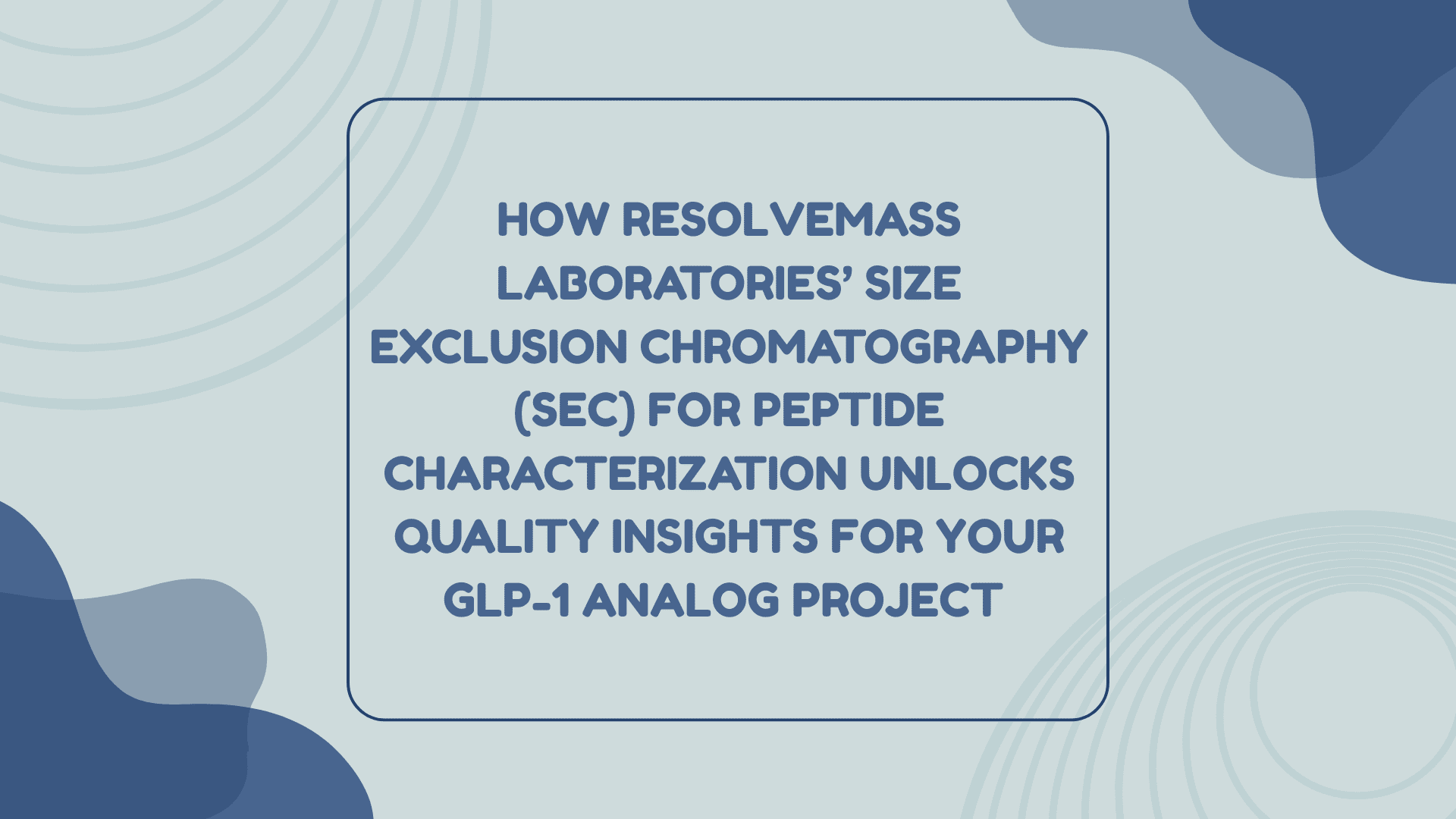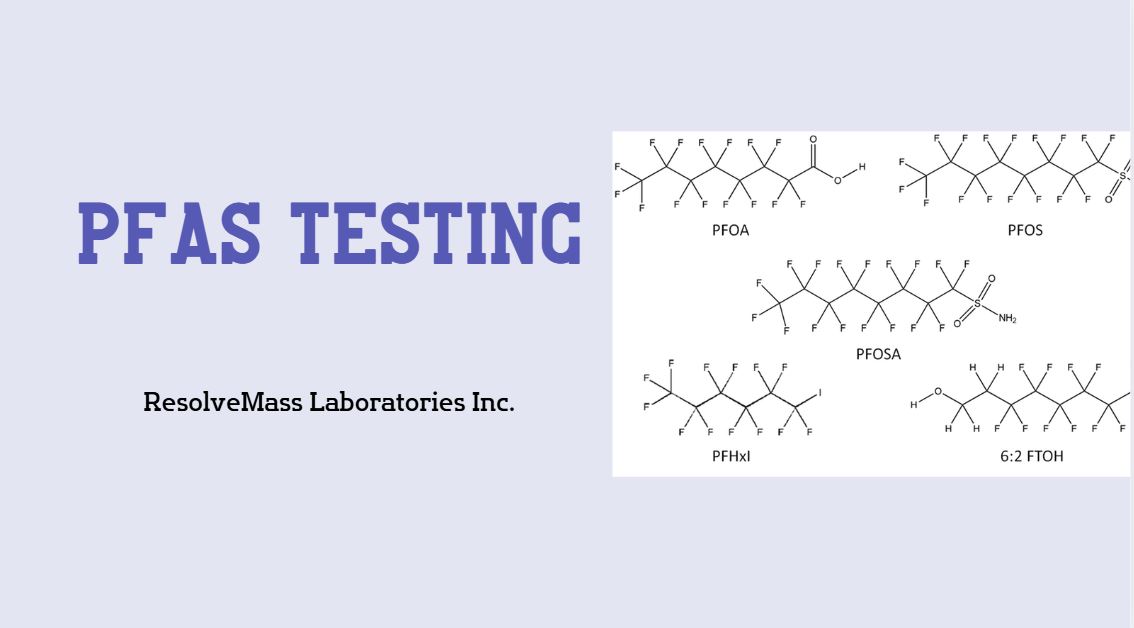Introduction
In the advanced field of peptide therapeutics—especially in GLP-1 analog development—achieving accurate molecular weight and aggregation data is crucial. ResolveMass Laboratories Inc. specializes in Size Exclusion Chromatography (SEC) for Peptide characterization, a globally trusted analytical approach known for its precision and reliability.
Through this method, scientists can separate molecules based purely on size, allowing clear insight into purity, aggregation, and molecular conformation. The non-destructive nature of SEC preserves the peptide’s integrity during analysis. At ResolveMass, every SEC test is performed under validated, GLP-compliant conditions to deliver consistent and regulatory-ready data. This precision-driven approach builds scientific confidence and supports every stage of your peptide characterization program.
🔍 Summary – Key Takeaways
- Size Exclusion Chromatography (SEC) provides accurate information about peptide molecular weight and purity.
- ResolveMass Laboratories applies validated, GLP-compliant SEC protocols for reliable GLP-1 analog evaluation.
- Real-time detection enables identification of aggregation and structural changes.
- SEC strengthens quality control and streamlines regulatory submissions.
- Advanced detectors and optimized columns ensure consistent, reproducible results.
Together, these strengths make Size Exclusion Chromatography (SEC) for Peptide research indispensable, allowing scientists to ensure molecular consistency and confidently move formulations from research to clinical stages.
Learn more about our related SEC and GPC services for detailed molecular weight analysis.
🧠 What Is Size Exclusion Chromatography (SEC) for Peptide Characterization?
Size Exclusion Chromatography (SEC) for Peptide characterization separates molecules based on their hydrodynamic radius. Unlike charge or chemical affinity-based methods, SEC focuses purely on size—making it ideal for studying purity, aggregation, and oligomerization in GLP-1 analogs.
At ResolveMass Laboratories, every SEC analysis is performed using high-performance columns and dual-detector systems under strict GLP standards. These dual detectors provide complete molecular profiling, detecting even minor aggregates. The technique also allows comparison of peptide batches over time to identify early degradation or instability.
Key Benefits of SEC for Peptide Characterization
- Non-destructive molecular separation
- High reproducibility for complex peptide systems
- Accurate detection of aggregates and oligomers
- Consistent batch-to-batch quality verification
- Full compliance with global regulatory guidelines
⚙️ How ResolveMass Laboratories Optimizes SEC for GLP-1 Analog Projects
The expert scientists at ResolveMass Laboratories blend analytical experience with customized SEC workflows built for peptide research. Each analysis begins with careful method optimization to match the peptide’s molecular characteristics and ensure peak performance.
Core Components of ResolveMass SEC for Peptide Analysis
| Component | Role in SEC for Peptides |
|---|---|
| Column Selection | Selected based on peptide molecular weight and hydrophilicity. Learn More |
| Detector Configuration | Uses MALS, RI, and UV detectors for accurate molecular profiling. |
| Buffer Optimization | Maintains solubility and prevents peptide aggregation. |
| Calibration Standards | Uses traceable standards for reliable molecular weight accuracy. |
Through SEC-MALS, ResolveMass delivers absolute molecular weight results without relying solely on column calibration, giving developers trustworthy data for purity and regulatory documentation.
🧪 Why Size Exclusion Chromatography (SEC) for Peptide Matters in GLP-1 Analog Development
The success of GLP-1 analog drugs depends on molecular uniformity and purity. Even slight aggregation can impact therapeutic performance or cause unwanted immune responses.
At ResolveMass, Size Exclusion Chromatography (SEC) for Peptide characterization reveals critical insights including:
- Aggregate levels affecting therapeutic stability
- Monomer-to-oligomer ratios determining biological activity
- Degradation indicators showing molecular vulnerabilities
These insights guide formulation design, stability testing, and scale-up production. Reliable SEC data also supports smooth regulatory submissions and helps predict shelf life. Learn more about GPC molecular weight analysis and its use in complex biopolymer research.
🧰 Advanced SEC Instrumentation at ResolveMass
ResolveMass Laboratories utilizes cutting-edge SEC systems specifically engineered for peptide and protein research.
Their Equipment Includes:
- High-resolution columns with precise pore distribution
- Temperature-controlled chambers ensuring peptide stability
- Real-time MALS + RI detection for molecular accuracy
- 21 CFR Part 11-compliant software guaranteeing data integrity
This integration of precision hardware and secure documentation ensures every SEC dataset is traceable, reproducible, and fully compliant. Explore our SEC analytical services to see how our infrastructure supports GLP-compliant peptide analysis.
🧩 Linking SEC Insights with Polymer Science Expertise
Many peptide therapeutics involve polymer conjugation (e.g., PEGylation) to improve stability and duration. ResolveMass seamlessly combines SEC and GPC methods to study both biomolecules and polymers.
See related reading:
By connecting polymer and peptide analysis, ResolveMass helps researchers understand bioconjugate interactions that influence drug performance and longevity—bridging biotechnology and materials science for innovative therapeutics.
📈 Quality Assurance and Data Integrity
At ResolveMass Laboratories, every SEC study is performed under strict GLP and ISO-certified procedures to ensure full traceability and reproducibility.
Core QA Principles Include:
- Certified calibration and verification standards
- Cross-instrument performance checks
- Independent data review by senior chemists
- Audit-ready, secure documentation
Our sample preparation guide ensures clean and uniform processing for each sample. These quality measures reinforce ResolveMass’s credibility as a global leader in SEC-based peptide analytics.
🌐 Why Scientists Trust ResolveMass Laboratories
With analytical excellence, ResolveMass Laboratories has become a trusted partner for global researchers and biotech developers.
Their core advantages include:
- Fast turnaround for peptide analysis
- Customized SEC methods for novel GLP-1 analogs
- Transparent client communication and technical support
Trust is built through proven performance—and ResolveMass consistently provides validated results that meet international standards. Their work helps pharmaceutical partners advance with confidence toward regulatory milestones.
🧭 How to Get Started with Your SEC Project
Whether you need a single SEC run or a full peptide characterization program, ResolveMass Laboratories offers complete project support.
- Contact our scientists via the ResolveMass Contact Page.
- Share your peptide specifications and objectives.
- Receive a customized SEC proposal.
- Obtain validated data with full interpretation and regulatory documentation.
This streamlined process ensures your project begins efficiently and produces reliable molecular insights every time.
✅ Conclusion
Size Exclusion Chromatography (SEC) for Peptide analysis at ResolveMass Laboratories defines the standard for precision and reliability in peptide research. From aggregation detection to molecular weight validation, their expertise ensures every GLP-1 analog meets the highest expectations of quality, safety, and compliance.
Explore our advanced SEC services and GPC solutions to gain complete molecular insight for your next peptide innovation.
Contact our experts today → ResolveMass Contact
FAQs on Size Exclusion Chromatography (SEC) for Peptide
Size Exclusion Chromatography (SEC) for Peptide analysis is ideal because it separates molecules based solely on their size without altering their natural structure. This allows scientists to accurately determine molecular weight, purity, and aggregation levels, providing a complete understanding of peptide stability and integrity.
Unlike reversed-phase chromatography, which separates molecules by hydrophobicity, SEC for Peptide characterization works on the principle of molecular size. This makes SEC the preferred technique for studying peptide aggregation, purity, and conformational stability without changing the sample composition.
At ResolveMass Laboratories, SEC analysis is performed using advanced detectors like MALS, RI, and UV. These instruments provide both absolute and relative molecular weight measurements, helping researchers obtain precise data on peptide structure, purity, and aggregation behavior in a single run.
Yes. Size Exclusion Chromatography (SEC) for Peptide is highly effective at detecting and quantifying aggregated species. By separating monomers from dimers or higher-order aggregates, SEC helps evaluate peptide stability and ensures that therapeutic candidates maintain their required structural uniformity.
ResolveMass Laboratories uses gentle buffer systems such as phosphate-buffered saline (PBS) or phosphate buffers with mild surfactants. These buffers maintain peptide solubility, reduce non-specific binding, and preserve the sample’s natural conformation throughout the SEC analysis process.
Absolutely. SEC for Peptide analysis can be tailored with optimized columns and detectors to resolve even small peptides below 2 kDa. The method’s sensitivity and precision make it an excellent choice for detailed analysis of short peptide chains or synthetic analogs.
Yes. ResolveMass Laboratories designs customized SEC workflows to match each peptide’s molecular weight, size, and stability requirements. This personalized approach ensures consistent, reproducible results tailored specifically for each client’s GLP-1 analog or peptide therapeutic project.
References
- Balfour, H. (2022, April 29). Advancing extractables and leachables testing. European Pharmaceutical Review. https://www.europeanpharmaceuticalreview.com/article/170814/advancing-extractables-and-leachables-testing/
- Eckford, C. (2024, January 22). Single-use systems to drive E&L testing market growth. European Pharmaceutical Review. https://www.europeanpharmaceuticalreview.com/news/196367/single-use-systems-to-drive-el-testing-market-growth/


